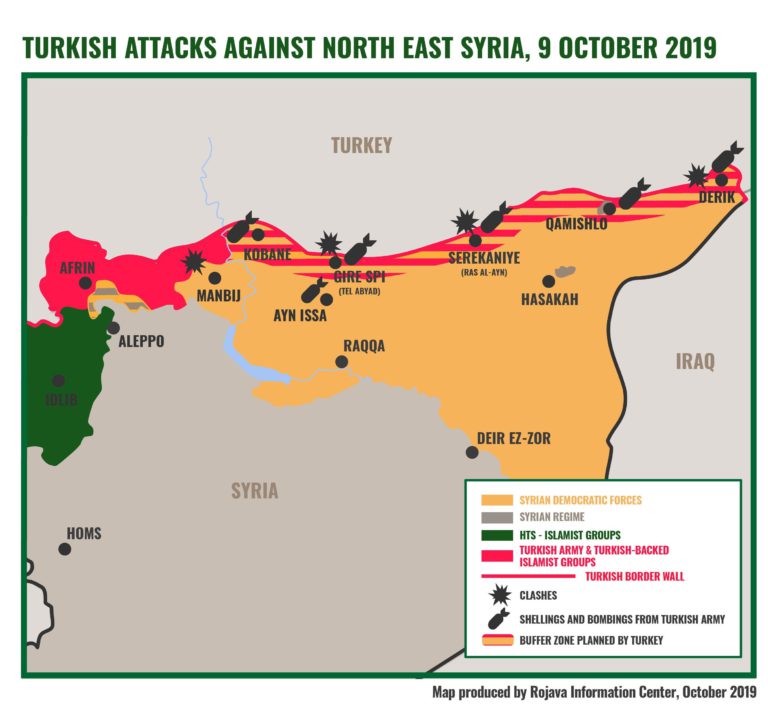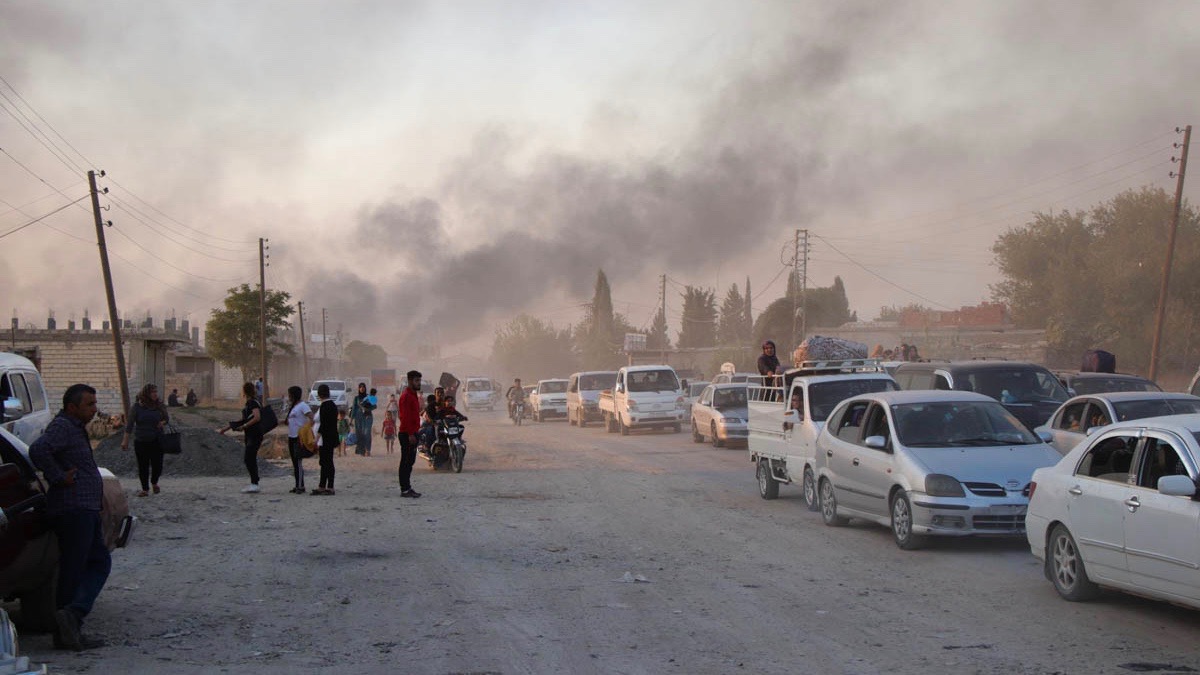At least 14 civilians, including a baby, were killed and hundreds injured in the first four days of the Turkish invasion of northeastern Syria that began on October 9. Turkish president Recep Tayyip Erdogan had announced on Twitter that the army, along with the Syrian National Army – paramilitaries at the service of Erdogan who were previously part of the ‘Free Syrian Army’- began operations targeting the Kurdish militia that controls the region. At least 100,000 people have been displaced, according to media reports.
Turkey claims that its aim is to avoid “the creation of a corridor of terror” and take control of a strip of territory on the border that is 120 kilometers long and 30 wide. The reality is very different: Erdogan is anxious to occupy the northeastern region which is known as Autonomous Administration of North and East Syria (Rojava), eliminate Kurdish militias and expel the nearly two million native Kurdish residents.
The Turkish government is also exploring the possibility of resettling a majority of the almost 3.6 million Syrian refugees currently residing in Turkey.
On October 9, some 60 Turkish fighter jets bombed civilian zones. The offensive targeted the border cities of Ras al Ayn (Serêkanîye in Kurdish) and Qamishhlo, which were under the control of the People’s Protection Units (Yekîneyên Parastina Gel -YPG-, in Kurdish). Turkey, on October 12, claimed that its soldiers had captured Ras al Ayn although the Kurdish forces denied it.

Mustafa Bali, spokesperson of the Syrian Democratic Forces (SDF), said on his Twitter account: “Turkish warplanes have started to carry out airstrikes on civilian areas. There is a huge panic among people of the region”.
The SDF had earlier reported that a group linked to Daesh (Islamic State) had attacked civilians in the south of Ras al Ayn but that Kurdish forces were repelling the aggressors. The IS also reportedly claimed responsibility for a car bomb attack in Qamishhlo.
Hours before the attacks from Turkey, the civilian population began to flee on motorcycles, trucks and even on foot, with suitcases or backpacks full of whatever they could carry.
The oil-rich Syrian territories lying to the east of the river Euphrates are predominantly populated by the Kurds. Since the beginning of the current war in Syria in 2011, the region has been controlled by Kurdish fighters belonging to the YPG. In 2015, they were instrumental in creating the SDF, a broad alliance of secular forces against the rising threat of the Islamic State.
Despite their crucial role in defeating the Islamic State, the YPG has always been an existential threat to Turkey as it has a close relationship with the Kurdish Workers’ Party (PKK). The PKK, a people’s movement in the Kurdish-dominated regions of Turkey, has been subject to state persecution since it was founded. The key political and ideological leader of the PKK, Abdullah Öcalan, has been incarcerated on an island prison in isolation since 1999.
At least 10,000 SDF soldiers died in the war against IS. After liberating the region, the Autonomous Administration of North and East Syria was founded, with the active support of the US.
According to an agreement signed with the US earlier in August, Turkey was to create a 30 km deep “safe zone” in northeast Syria. This safe zone would serve the twin purpose of providing Turkey ‘protection’ from the SDF, along with enabling the potential re-settlement of its Syrian refugees.
While the SDF had opposed this deal, under pressure from the US, it agreed to allow Turkish presence up to 5-9 km inside its territories against the Turkish demand of a 30 km.
Adhering to the deal, the US has already begun withdrawing its limited forces from the region. President Donald Trump has been vocal about a complete withdrawal of the 2,000 US troops, who have been deployed in the region for the last three years. The SDF has called this a betrayal by the US.
However, despite agreeing to the invasion, Trump has issued a vague warning asking Turkey to remain within the limits, or face US wrath against its economy. Most other major powers, including the Europeans, have already advised Turkey to desist from the war.
Meanwhile, reacting to the European criticism of its Syria offensive, Erdogan threatened to open the gates of Europe for the Syrian refugees. The European Union pays Turkey millions every year to keep Syrian refugees from entering Europe.
According to reports, there are thousands of Islamic State fighters in the region currently being held at bay by the SDF. The invasion by Turkey may give them a free hand.
Resistance
The authorities of the Autonomous Administration called for “a general mobilization for three days” to confront the threats of the offensive of Turkey, and have called for “resistance”.
In addition, they placed “full responsibility in case of a humanitarian disaster” on the US, their former ally, as well as on the UN, Russia and the European Union. Finland and Norway announced that they would suspend all arms sales to Turkey this week.
The invasion puts in danger all the initiatives of self-organization that have changed the life of millions of people in the past seven years. The councils, communes and self-managed cooperatives, which are part of a multi-ethnic and multi-religious project, have guaranteed the peaceful coexistence of millions of Kurds, Arabs and members of other communities.
Mobilizations against the invasion
Following the invasion, protests were organized in numerous cities across the world, including in Zaragoza, Barcelona, Paris, London, Naples and Buenos Aires. Protesters gathered outside Turkish consulates and embassies to demand an end to the aggression.
With reports from Colombia Informa





